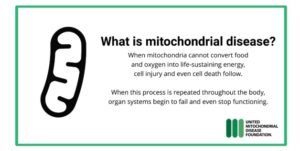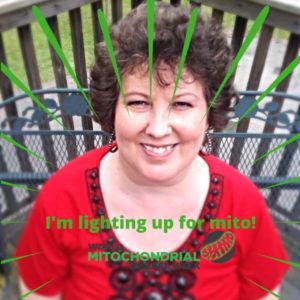Written by Gina Baker
This year Global Mitochondrial Disease Awareness week is September 19-25, but my family and I will continue to fight this battle for the rest of our lives. For the most part, we are medically unsupported because of lack of mitochondrial disease symptom awareness and education in the medical field. As with many “rare” conditions, doctors are only trained to recognize the most obvious cases. Most of us “don’t look sick” and our standard work ups look good.
MY STORY
My story is similar to so many suffering from mitochondrial diseases. I became totally debilitated by it in the prime of my life at the age of 33. In the 29 years since then, instead of living, potentially, the most productive, fulfilling years of my life, I have struggled to just keep living. I vacillate between being nearly totally bedridden and being housebound.
From the age of 11 on, I periodically suffered from prolonged bouts of unexplained fatigue, malaise, and vague illnesses that were always attributed to a virus, the catchall diagnosis of the time. I missed a lot of school, so much so that for a couple of years of high school, I was threatened with failing, despite keeping honor roll grades, because of the number of days I was absent from school.
As I finished high school and entered college and then the workforce, I was somehow able to push through and graduate both high school and college with honors and excel at my job as a medical laboratory technologist. I guess most of it was just drive but, perhaps, some of my symptoms had temporarily abated to some degree.
The symptoms that were eventually diagnosed as mitochondrial disease – failure of my adrenal glands, thyroid, and pituitary— led to my collapse in 1992. It would take eight years to be diagnosed with mitochondrial disease. In addition to profound, debilitating fatigue, muscle weakness and pain, and frequent episodes of lactic acidosis, I have developed heart failure and diminished lung capacity due to weak breathing muscles and diaphragm weakness. Additionally, I have been told by my doctors that I could end up on a ventilator.
In late June of 1992, my life completely changed forever almost overnight. I went from being a dancer who danced and taught classes 3-4 hours a day 3-4 days a week (while continuing work as a medical laboratory technologist supporting my “dance habit”, as my workmates liked to joke), to not being able to get out of bed and go to work. I remember the exact day I couldn’t get up – July 7, 1992. I had been on vacation for a week that was mostly spent in bed. On Monday, I did not know what was wrong, but something dreadfully was. I had never felt so profoundly fatigued and fearful in my life. My body just wouldn’t work.
This disease destroys lives and families. It is multigenerational. The sick are often left caring for the sick as in my mother’s and my case. My maternal grandmother suffered greatly from it with extreme GI problems and heart problems. My uncle spent the last 25 years of his life bedridden and died from it. My mother’s life and energy have been severely compromised by it. I started having intermittent symptoms at age 11. I thought since I had no children, this life destroying illness would end with me. However, that may not be the case. My siblings carry the defect from my mother. Their children can be affected and, at least, one seems to be. 
People remain undiagnosed in large part because of the lack of mitochondrial disease awareness among doctors, the lack of specialists in mitochondrial medicine, and the difficulty of diagnosis. I don’t think help will come for me in my lifetime, but I continue to advocate and take the fight for awareness to whomever I can for the next generations in my family. I do not want anyone else in my family to become a statistic of the dozens of children, adolescents, and young adults who die every day from this disease along with those of us who live such poor quality lives and die, agonizingly slowly.
MitoAction – Helping People With Mitochondrial Disease


